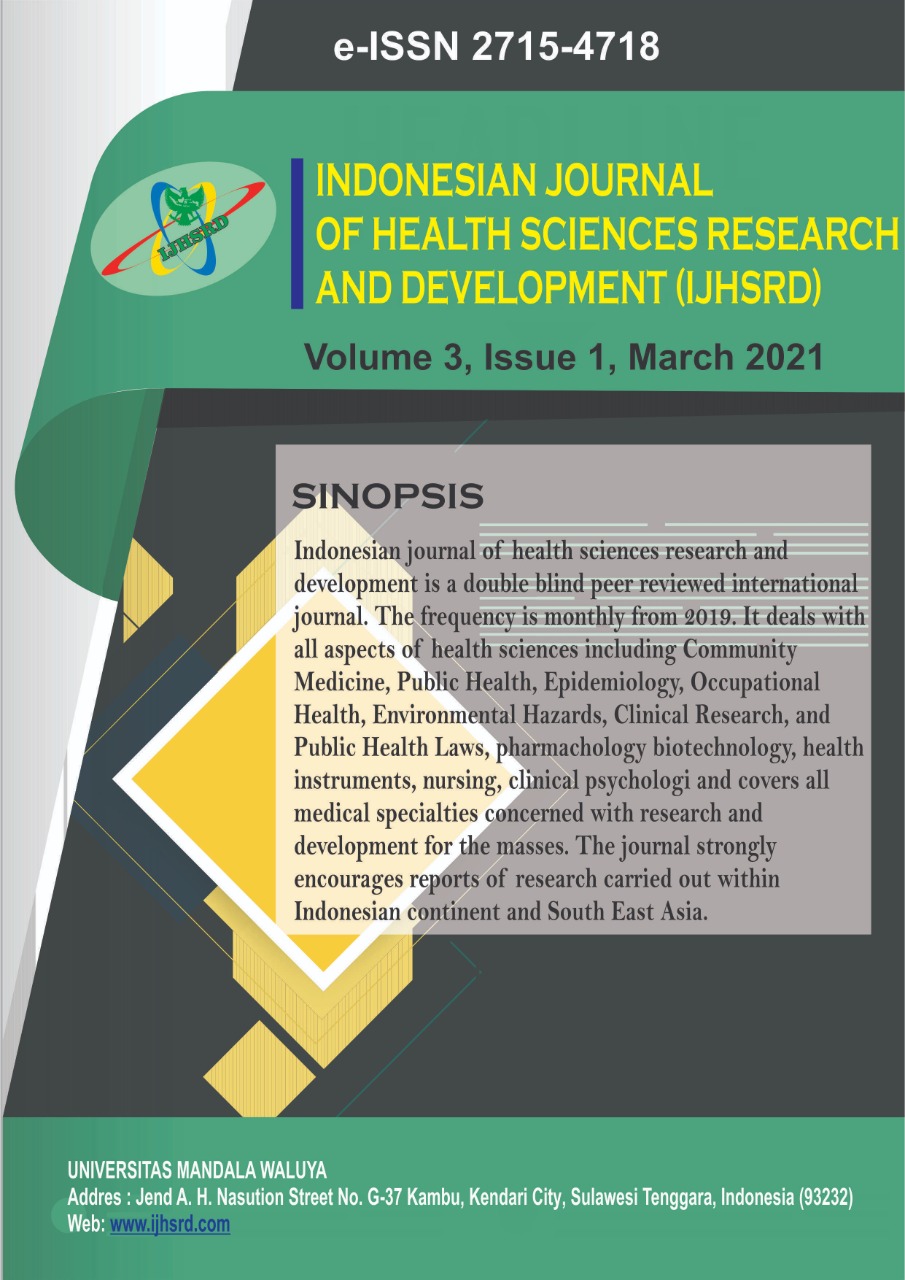Main Article Content
Abstract
Background:Diabetes mellitus (DM) is a phenomenon which the body cannot produce insulin supply which is indicated by increasing blood glucose levels. Red Rice (Oriza nivara) contains flavonoid compounds which have antidiabetic abilities. It can reduce blood glucose by increasing insulin secretion and preventing insulin resistance. This study aims to determine the effect of giving brown rice (Oriza nivara) to change blood glucose levels in people with diabetes mellitus in Kendari City.
Methods: This research method was carried out with a quasi-experimental design with pre-post test design for 1 week with primary and secondary data collection techniques. The respondents were determined by proportional random sampling. Respondents in this study were 33 people with DM.
Result:The results of the study on checking blood glucose levels before and after giving brown rice (oriza nivara) within 1 week obtained P value = 0.000 < alpha 0.05.
Conclusion: there is a significant effect of giving brown rice (oriza nivara) on changes in blood glucose level in diabetes mellitus people in Kendari City.
Keywords
Article Details

This work is licensed under a Creative Commons Attribution-ShareAlike 4.0 International License.
References
- Ministry of Health R. Main results of RISKESDAS 2018. Online) http: // wwwMinistry of Health go id / resources / download / latest-info / material_rakorpop_2018 / Results% 20Riskesdas. 2018; 202018.
- BP statistics. Human Development Index 2016. Kendari Southeast Sulawesi: Central Bureau of Statistics. 2017.
- Amir SM, Wungouw H, Pangemanan D. Current blood glucose levels in type 2 diabetes mellitus patients at the Shoulder Health Center, Manado city. eBiomedics. 2015; 3 (1).
- DAHLIA S. The Effect of White Rice, Red and Black Rice Dekok on the Effects of Hyperglycemia in Swiss Webster 2019 Male White Mice.
- Mackey A, Gass SM. Second language research: Methodology and design: Routledge; 2015.
- Ratu G, Badji A. Profile of Urinary Tract Stones Analysis in Clinical Pathology Laboratory. Indonesian Journal of Clinical Pathology and Medical Laboratory. 2018; 12 (3): 114-7.
- Kuszairi K. The Effectiveness of Giving Brown Rice Diet in Lowering Blood Sugar Levels in Diabetes Mellitus Patients at Pademawu Puskesmas Pamekasan. Journal of Islamic Medicine. 2017; 1 (2): 97-107.
- Pradini WU, Marchianti ACN, Riyanti R. The effectiveness of brown rice to reduce total cholesterol levels in Type 2 DM patients (The Effectiveness of Red Rice to Decrease Total Cholesterol in Type 2 DM Patients). 2017.
- Salamah IR. Diversification of Cookies with Addition of Red Rice Flour (Oryza nivara) Against Anthocyanin Levels and Acceptability: STIKES PKU Muhammadiyah Surakarta; 2017.
- Pradini WU, Marchianti ACN, Riyanti R. The effect of red rice to decrease total cholesterol in type 2 dm patients. AMS Journal. 2017; 3 (1): 7-12.
- Diass WC, Estiasih T. Effect of Dioscoreaceae Family Tuber Bioactive Compounds on Blood Lipid Profile Conditions: A Literature Review [IN PRESS APRIL 2015]. Journal of Food and Agroindustry. 2014; 3 (2): 424-30.
- McLennan R, Schumacher LJ, Morrison JA, Teddy JM, Ridenour DA, Box AC, et al. Neural crest migration is driven by a few trailblazer cells with a unique molecular signature narrowly confined to the invasive front. Development. 2015; 142 (11): 2014-25.
- Rensiansi L, Iwaningsih S. Effect of Consumption of Ir-36 Rice and Brown Rice on Blood Sugar Level Profiles of Type 2 Diabetes Patients in Public Health Centers, Pasar Rebo District, East Jakarta. ARGIPA (Nutrition and Food Archives). 2016; 1 (1): 41-50.
